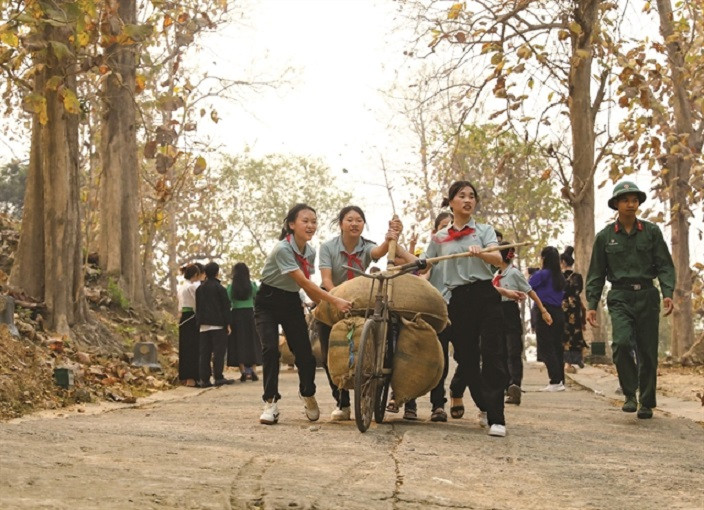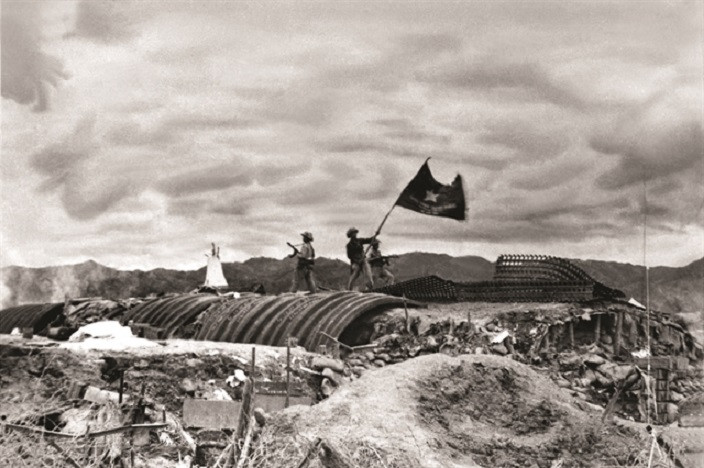
For the past seventy years, Điện Biên Phủ stands for bravery, dignity and victory of an entire nation who rose up to win back their independence. Điện Biên Phủ Campaign pulled together the physical and mindful strength of the nation.
From the barefoot soldiers and volunteer transporters, the human forces who pushed their 100-kilo plus bicycles to transport supplies to the battlefield or the soldiers who pulled heavy artillery pieces up to the mountains with their hands, millions of men and women would give up all of their most precious assets: their youth was dedicated to serve and fight for national freedom and independence.
Millions people gave all they had
For a few weeks now, a series of ceremonies to pay tribute to fallen soldiers, a series of activities have been going on not only in Điện Biên Phủ City but around the country, especially provinces where a large number of soldiers and volunteers had worked and supported the campaign.
On the contrary to the joyous songs, or positive energy that has been channeled from Điện Biên elsewhere in the country, the nine-year-long resistance war had seen 8 military campaigns before the final Điện Biên, and war veteran Nguyễn Công Dinh, at 97 years of age, remembers it well.
"Alas, there was nothing joyful about war," he remembers. "No matter how miserable the condition could be, you always had to keep a merry spirit to accomplish your duty."
And he was to carry on order from no other than General Võ Nguyên Giáp, who entrusted him an important letter, that turned the campaign into a different approach.
This year, Dinh says he's not feeling well, so he would not go to celebrations, even if they are held in Hà Nội. "The weather has made me feel quite tired these days," he says. "I really don't know if I can make it to any of the reunions."
To prepare for the 50th anniversary of the Điện Biên Phủ battle victory, he went to Điện Biên for two years in 2003 and 2004 to check. "After the trip, I had problems with my heart and had to have three stents placed in my heart," he says.
"I worked at the 'brain office' of the headquarters and was active from day 1 of the campaign, so I was very much involved," he says. "Especially those commanders, they trusted me, I guess, so they always wanted me to accompany them."
During the campaign, I fulfilled my duty and perhaps accomplished something vital.
I could say Điện Biên campaign was a milestone that changed my life.
Dinh's efforts across all the military campaigns were considerable and he is proud of his exploits and the victory that was so hard won.
"I participated in all eight big campaigns during the 9-year resistance war against the French. My name was included in all of the campaigns: the Border Campaign, Hà Nam Ninh, Hòa Bình, Tây Bắc (Lý Thường Kiệt) and the Tây Bắc campaign that liberated the Upper Laos, and finally, Điện Biên Phủ. Now that I've become a historical witness, I can talk about what I've been through," he says.
"Điện Biên Phủ was an enormous campaign, and nearly 5 million people took part in it. Their contributions are very great, my part was very small. It may not be worth your while."
Despite Dinh's modesty, it's clear the veteran played a crucial role and has many stories to tell. One particular act was of huge significance to the outcome of the war
A messenger and a vital letter

According to the initial plan, January 26 was set to be the day when Việt Minh soldiers [resistance army] opened fire to start Điện Biên Phủ campaign.
But on the morning of that day, Gen Võ Nguyên Giáp, commander-in-chief of the Vietnam People's Army, had a final meeting with the Front Party Committee on the battle, and after serious discussion, the participating officers decided to change the tactics of the entire campaign from the "Fast Strike, Fast Victory" approach to "Steady Attack, Steady Advance".
But for this vital change to be implemented, he had to get approval from President Hồ Chí Minh and the Politburo, who lived in the Safety Zone in Định Hóa, Thái Nguyên Province, some 500km away.
Dinh, as always, was ready to carry out his order given, and again was entrusted with the assignment to take Gen Giáp's letter to the President as fog fell on the night of January 27, 1954.
January in the mountains often saw fog in the late afternoon, and the activities of the Việt Minh resistance forces always took place from late in the evening until the next morning. Dinh left the headquarters in a car. Time was of the essence.
The road from Gen Giáp's headquarters to where President Hồ lived crossed three points that were often heavily bombarded: the Pha Đin Pass, the Cò Nòi T-junction and Âu Lâu Wharf.
During the trip, the road was heavily bombed, and the car had to run rough terrain with many bomb craters. It was critical that the letter be delivered whatever the costs and risks involved.
By midnight on January 28, when they got to Âu Lâu Wharf, a boatman took them on a ferry. When they got to the middle of the river, French troops shots flared up above their heads. Dinh remembers the ferryman telling him that enemy artillery fire was coming their way.
After two white nights, Dinh arrived in Định Hóa, and handed over the letter to Gen Văn Tiến Dũng to present it to President Hồ. The Politburo got the message and would get in touch with Gen Giáp by telegraph. Mr. Dinh went back to the front after safely delivered the letter.
"My contribution was very little. But it was my one-of-a-lifetime experience that shaped me as I took part in our country's fight against invaders to protect our country. Simple as that,” Mr. Dinh said.
Điện Biên Phủ legacy
This year, Dinh can no longer go up to Điện Biên, but he always has the spirit of the battle of his life inside him.
After Điện Biên Phủ victory, Vietnamese people still had to endure even more hardship and fierce fighting. We enjoyed real peace only decades later.
Cherish the victory of Điện Biên, it only reminds us that Việt Nam as a country must ensure to keep peace reigning long on Việt Nam.
The men and women heroes of Điện Biên Phủ have all become aged as time goes by, but the great war they fought to free their country from colonialism shall forever go down in history as one of the greatest exploits of the oppressed peoples. VNS